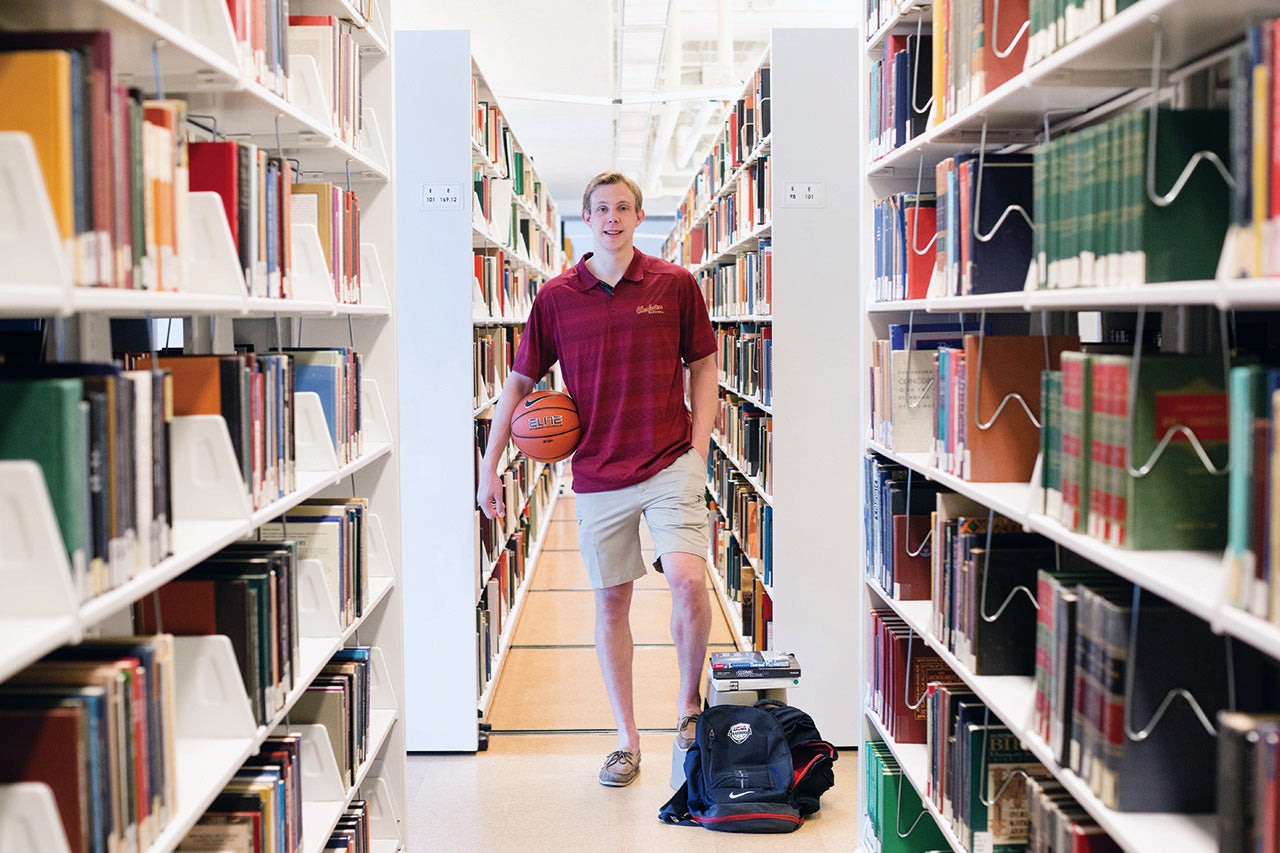He calmly toes the free throw line, lets out a slow breath and in one smooth, artful motion releases the ball– underhanded. As the son of an NBA Hall of Famer, it’s easy to think that the most impressive things on Canyon Barry’s résumé are his lineage and prowess on the basketball court, but you’d be wrong.
Barry ’16 ought to be on a book tour touting a dynamic story of achievement that extends far beyond the world of sports. The narrative of his four years at the College reads like idealized fiction– a perfect 4.0 GPA, star athlete on the College’s marquee sports team and full engagement in a variety of volunteer pursuits. He’s a two-time Academic All American and one of only two NCAA Division I athletes in the U.S. who shoot free throws underhanded. Did we mention that he also plays the guitar? It’s not every day that a university graduates such a student. In fact, it’s not even every decade.
A native of Colorado Springs, Colo., Barry is the son of Rick Barry, one of the top 50 basketball players of all time, and Lynn Norenberg Barry, who earned a place in the College of William & Mary’s Athletic Hall of Fame for basketball and track. But the 22-year-old is exceptional in his own right. And when you flesh out the chapters of his story, that’s when Barry’s career at the College really starts to impress.
First, consider the responsibilities shouldered by a student-athlete. Long hours on the basketball court don’t leave a lot of time for studying. But Barry has stayed as committed to his academics as he has to his sport.
“One of the hardest things,” he explains, “is trying to maintain balance between being a student and being an athlete. During the season, there are a lot of long nights where you’ve just played a game and you’re exhausted and it’s 10 p.m. Still, you’ve got to go back and study for a test or finish homework or write a paper. You quickly learn time management because you have to be able to be productive when you can. So instead of watching TV or listening to music on a 10-minute break, you finish a couple of physics problems or start writing that paper.”
For four years, he maintained a perfect 4.0 – majoring in physics, no less, with a minor in math. His senior research project, which involved working with graphene (a nanomaterial), drives home the point.
“We used atomic-force microscopy and nano-indentation to characterize the material’s properties, such as stiffness,” he explains. “We started by using DVD burner reduction to convert graphene oxide to graphene, which is pretty hands-on work in the lab.”
What the future holds for his graduate school studies is still unfolding. Barry isn’t sure if he’ll continue his work in physics or if he’ll pursue his growing interests in nuclear or mechanical engineering.
“I’m grateful to the physics department,” he says. “The people there have helped me lay the foundation for a successful career doing something that I love, and I know I’m ready to excel at the grad school level.”
But his post-undergraduate plans don’t just include earning a master’s degree. Barry also wants to take his basketball skills to the next level – preferably joining a team that has the potential to make the NCAA tournament.
“I’ve got one more year of eligibility to play college ball,” he says, “so I hope to find a grad school that’s a good fit for me both athletically and academically. But I’m not trying to go somewhere and play 10 minutes a game and be the ninth man off the bench. I want to be an impact player, and ideally have the opportunity to get good exposure that will potentially help with my professional aspirations after grad school.”
That’s right. Barry intends to play pro ball: “Hopefully, I’ll find a role in the NBA or in Europe or elsewhere overseas. You can only play basketball for a finite number of years, so I’m just trying to maximize that and enjoy the process.”
If he does end up on a professional team’s roster, Barry is well aware that not every aspect of that will be within his control. “At the College,” he says, “I played for four different basketball coaches and the main takeaway for me is that you can only control what you put in. You can control your attitude and you can control your effort, but you have no control over who becomes head coach and what choices that person makes. You just have to go in the gym every day and work to become the best player you can be. The rest will take care of itself.”
When you examine the trajectory of Barry’s Cougars playing career, it’s clear this outlook has merit. Throughout each of his four years, Barry became an increasingly effective scorer, averaging 19.7 points per game in his final season. And that’s a trend he hopes to continue.
“I think it’s dangerous anytime you become satisfied in a sport,” he says. “As an athlete, there are always things that you can improve upon. I think I’m definitely on the right path and that’s been my goal every year – to be a better player that year than I was the previous one. Hopefully, I’ll continue that trend wherever I end up. I’ll keep trying to be the best player I can be every day that I step on the court.”
And if Barry ever does go on a book tour, that last line would seem just about perfect on the book jacket.
Editor’s Note: After a recruiting process that captured national headlines, Barry selected the University of Florida.





